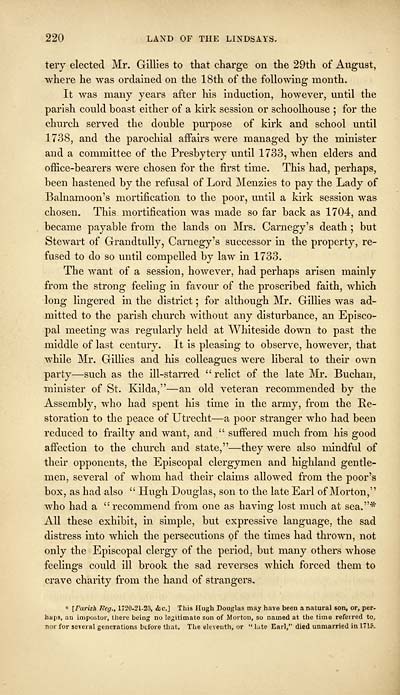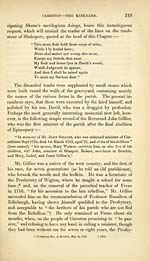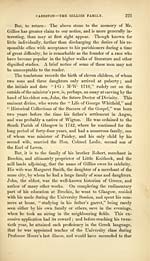Download files
Complete book:
Individual page:
Thumbnail gallery: Grid view | List view

220 LAND OF THE LINDSAYS.
tery elected Mr. Gillies to that charge on the 29th of August,
where he was ordained on the 18th of the following month.
It was many years after his induction, however, until the
parish could boast either of a kirk session or schoolhouse ; for the
church served the double purpose of kirk and school until
1738, and the parochial affairs were managed by the minister
and a committee of the Presbytery until 1733, when elders and
office-bearers were chosen for the first time. This had, perhaps,
been hastened by the refusal of Lord Menzies to pay the Lady of
Balnamoon's mortification to the poor, until a kirk session was
chosen. This mortification was made so far back as 1704, and
became payable from the lands on Mrs. Carnegy's death ; but
Stewart of Grandtully, Carnegy's successor in the property, re-
fused to do so until compelled by law in 1733.
The want of a session, however, had perhaps arisen mainly
from the strong feeling in favour of the proscribed faith, which
long lingered in the district ; for although Mr. Gillies was ad-
mitted to the parish church without any disturbance, an Episco-
pal meeting was regularly held at Whiteside down to past the
middle of last century. It is pleasing to observe, however, that
while Mr. Gillies and his colleagues were liberal to their own
party — such as the ill-starred " relict of the late Mr. Buchan,
minister of St. Kilda," — an old veteran recommended by the
Assembly, who had spent his time in the army, from the Re-
storation to the peace of Utrecht — a poor stranger who had been
reduced to frailty and want, and " suffered much from his good
affection to the church and state," — they were also mindful of
their opponents, the Episcopal clergymen and highland gentle-
men, several of whom had their claims allowed from the poor's
box, as had also " Hugh Douglas, son to the late Earl of Morton,"
who had a "recommend from one as having lost much at sea."*
All these exhibit, in simple, but expressive language, the sad
distress into which the persecutions of the times had thrown, not
only the Episcopal clergy of the period, but many others whose
feelings could ill brook the sad reverses which forced them to
crave charity from the hand of strangers.
* [Parish Beg., 1720-21-23, &c] This Hugh Douglas may have been a natural son, or, per-
haps, au impostor, there being no legitimate son of Morton, so named at the time referred to,
nor for several generations before that. The eleventh, or " Lite Earl," died unmarried in 1715,
tery elected Mr. Gillies to that charge on the 29th of August,
where he was ordained on the 18th of the following month.
It was many years after his induction, however, until the
parish could boast either of a kirk session or schoolhouse ; for the
church served the double purpose of kirk and school until
1738, and the parochial affairs were managed by the minister
and a committee of the Presbytery until 1733, when elders and
office-bearers were chosen for the first time. This had, perhaps,
been hastened by the refusal of Lord Menzies to pay the Lady of
Balnamoon's mortification to the poor, until a kirk session was
chosen. This mortification was made so far back as 1704, and
became payable from the lands on Mrs. Carnegy's death ; but
Stewart of Grandtully, Carnegy's successor in the property, re-
fused to do so until compelled by law in 1733.
The want of a session, however, had perhaps arisen mainly
from the strong feeling in favour of the proscribed faith, which
long lingered in the district ; for although Mr. Gillies was ad-
mitted to the parish church without any disturbance, an Episco-
pal meeting was regularly held at Whiteside down to past the
middle of last century. It is pleasing to observe, however, that
while Mr. Gillies and his colleagues were liberal to their own
party — such as the ill-starred " relict of the late Mr. Buchan,
minister of St. Kilda," — an old veteran recommended by the
Assembly, who had spent his time in the army, from the Re-
storation to the peace of Utrecht — a poor stranger who had been
reduced to frailty and want, and " suffered much from his good
affection to the church and state," — they were also mindful of
their opponents, the Episcopal clergymen and highland gentle-
men, several of whom had their claims allowed from the poor's
box, as had also " Hugh Douglas, son to the late Earl of Morton,"
who had a "recommend from one as having lost much at sea."*
All these exhibit, in simple, but expressive language, the sad
distress into which the persecutions of the times had thrown, not
only the Episcopal clergy of the period, but many others whose
feelings could ill brook the sad reverses which forced them to
crave charity from the hand of strangers.
* [Parish Beg., 1720-21-23, &c] This Hugh Douglas may have been a natural son, or, per-
haps, au impostor, there being no legitimate son of Morton, so named at the time referred to,
nor for several generations before that. The eleventh, or " Lite Earl," died unmarried in 1715,
Set display mode to:
![]() Universal Viewer |
Universal Viewer | ![]() Mirador |
Large image | Transcription
Mirador |
Large image | Transcription
Images and transcriptions on this page, including medium image downloads, may be used under the Creative Commons Attribution 4.0 International Licence unless otherwise stated. ![]()
| Histories of Scottish families > History and traditions of the land of the Lindsays in Angus and Mearns > (238) Page 220 |
|---|
| Permanent URL | https://digital.nls.uk/94871882 |
|---|
| Description | A selection of almost 400 printed items relating to the history of Scottish families, mostly dating from the 19th and early 20th centuries. Includes memoirs, genealogies and clan histories, with a few produced by emigrant families. The earliest family history goes back to AD 916. |
|---|

